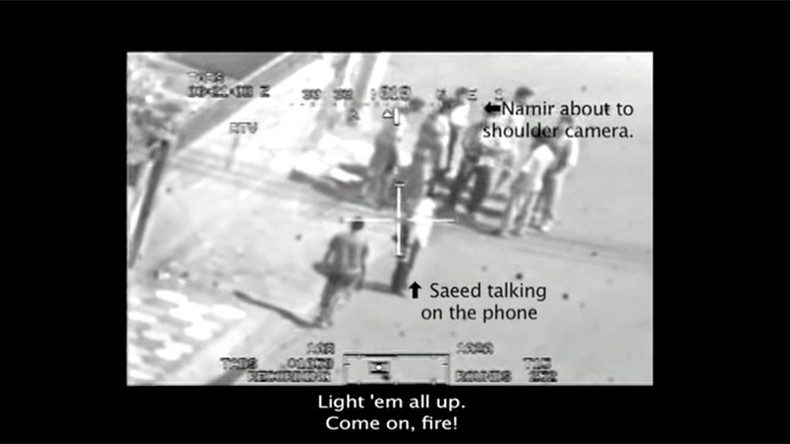‘Collateral Murder’ 10 Years Later: Who Among You Forgets?

Ten years ago this week—April 5, 2010 in fact—Wikileaks published a 2007 video that depicts three consecutive strikes by two American Apache helicopters tearing into a group of people on the ground in Baghdad, Iraq. When the smoke cleared there were at least 12 people dead, including two Reuters journalists. Others were wounded, including two children who had been riding in a minivan that had pulled up to assist the victims. It is probably one of the eeriest visual depictions of U.S. empire in the 21st Century (aside from Lynndie England holding that leash): an imperious slaying from a few hundred feet above. It’s a minimalist presentation—the crackle of the communications and gunship pilots’ macabre banter, the view of the scattered individuals through the cockpit camera, the spray of fire. The remains.
In October 2010 I interviewed a group of Iraq veterans who were home and now protesting the war in Washington, D.C. I had deemed them “the hope” of the anti-war movement because they had real-life experience: one was a female Marine who had been raped by another Marine on a forward operating base. Another had been injured by an IED in 2006 while in Iraq, but despite being “high on psychotropic drugs” during his intervening convalescence, volunteered to go back on a second deployment out of “guilt.”
A third, an infantry solider named Ethan McCord, was one of the men who had scooped up the bodies of the wounded children in the apache helicopter attack, what is now known as the “Collateral Murder Video.”
He told me that on the night of this traumatizing event, he approached his commanding officer and suggested he might need to talk to someone. “I was told to suck it up and drive on,” he said. “I sucked it up.”
When he returned home he started drinking too much and tried to pursue counseling. “My unit degraded me for seeking mental health,” McCord recalled at the time. So when he was redeployed, he wasn’t surprised to see a bunch of other guys “heavily medicated” due to PTSD. They were all on a return deployment.

Ethan and his fellow soldier Josh Steiber, who was also on the ground that day in Baghdad, wrote an open letter to the families of the dead on April 19, 2010, apologizing for what happened. From the letter:
We have been speaking to whoever will listen, telling them that what was shown in the Wikileaks video only begins to depict the suffering we have created. From our own experiences, and the experiences of other veterans we have talked to, we know that the acts depicted in this video are everyday occurrences of this war: this is the nature of how U.S.-led wars are carried out in this region.
Aside from seeing real human beings vaporized like a video game, the hardest thing about the video is hearing the pilots’ ghoulish exchanges. One chuckles a bit when they see an armored vehicle rolling over one of the bodies. Another comments after they realize two children were in the minivan, dead. “Well, it’s their fault for bringing their kids into a battle.”
It seems like so much more than a decade since this video shocked the nation—even for a brief moment. Because it wasn’t long before people went back to their business, cheering on the counterinsurgency in Afghanistan, conveniently ignoring the waves of veterans coming back with stories even worse than McCord’s. A collective amnesia has papered over the war crimes in Baghdad, Haditha, Abu Ghraib, Nisour Square. There’s been a ton written about what the military strategy got wrong, but not a lot about this darker chapter: routine civilian killings, torture, and sending sick men back into battle.
Funny, the man who facilitated what should have been our reckoning with all of this — Julian Assange—is still in jail and could be extradited and tried soon in U.S. federal court. The government says he helped then-Bradley Manning download the hundreds of thousands of government documents that Wikileaks later published. One of them was the Collateral Murder video. This, and so many other documents painted a clear picture of what the Washington establishment was still denying: a failing war in which U.S. servicemembers and their superior officers were acting badly. In our name.
Now, the only thing people seem to care about is whether Julian is a Russian agent and debating over whether he is or isn’t “a journalist.” We forget that without his work, we would not have had video proof of what Iraqis on the ground, independent journalists, and traumatized veterans were already reporting: that we were not the golden liberators of Washington lore, and we were not winning.
How can we learn if we choose so easily to forget?